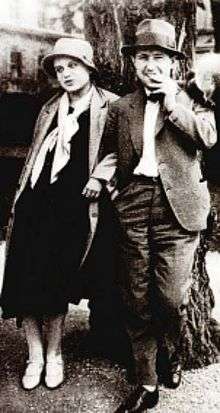Karel Teige
| Karel Teige | |
|---|---|
 | |
| Born |
13 December 1900 Prague, Austria-Hungary |
| Died |
1 October 1951 (aged 50) Prague, Czechoslovakia |
| Occupation | Publicist, literary critic |
| Nationality | Czech |
| Relatives | Josef Teige (father) |
Karel Teige (13 December 1900 in Prague – 1 October 1951 in Prague) was a Czech modernist avant-garde artist, writer, critic and one of the most important figures of the 1920s and 1930s movement. He was a member of the Devětsil (Butterbur) movement in the 1920s and also worked as an editor and graphic designer for Devětsil's monthly magazine ReD (Revue Devětsilu). One of his major works on architecture theory is The Minimum Dwelling (1932).[1]
Life and career
With evidently endless energy, Teige introduced modern art to Prague. Devětsil-sponsored exhibitions and events brought international avant-garde figures like Le Corbusier, Man Ray, Paul Klee, Vladimir Mayakovsky, and Walter Gropius, among many others, to lecture and perform in Prague. Teige interpreted their work, sometimes literally, for the Czech audience. In his 1935 Prague lecture, André Breton paid tribute to his "perfect intellectual fellowship" with Teige and Nezval: "Constantly interpreted by Teige in the most lively way, made to undergo an all-powerful lyric thrust by Nezval, Surrealism can flatter itself that it has blossomed in Prague as it has in Paris." [2]
Although not an architect, Teige was an articulate and knowledgeable architecture critic, an active participant in CIAM, and friends with Hannes Meyer, the second director of the Bauhaus. Teige and Meyer both believed in a scientific, functionalist approach to architecture, grounded in Marxist principles. In 1929 he famously criticized Le Corbusier's Mundaneum project (planned for Geneva but never built) on the grounds that Corbusier had departed from rational functionalism, and was on his way to becoming a mere stylist. Teige believed that 'the only aim and scope of modern architecture is the scientific solution of exact tasks of rational construction.'
After welcoming the Soviet army as liberators, Teige was silenced by the Communist government in 1948. In 1951 he died of a heart attack, said to be a result of a ferocious Soviet press campaign against him as a 'Trotskyite degenerate,' his papers were destroyed by the secret police, and his published work was suppressed for decades.
Writings
Original versions
Studies
- Stavba a báseň
- Svět, který se směje
- Svět, který voní
- Jarmark umění
- Surrealismus proti proudu
Scientific writings
- Soudobá mezinárodní architektura
- Moderní architektura v Československu
- Moderní fotografie v Československu
- Vývojové proměny v umění
- Vývoj sovětské architektury
- Sociologie architektury
- Jan Zrzavý
English Editions
- Modern Architecture in Czechoslovakia and Other Writings (Texts & Documents), J P Getty Trust Pubn, 2000, ISBN 0-89236-596-X
- The Minimum Dwelling, MIT Press, 2002, ISBN 0-262-20136-4
Secondary literature
- Karel Teige. L'Enfant Terrible of the Czech Modernist Avant-Garde, ed. by Eric Dluhosch and Rostislav Svácha, MIT Press, 1999, ISBN 0-262-04170-7 - includes 4 Essays of Teige
- Esther Levinger: "A life in nature - Karel Teige's journey from Poetism to Surrealism" In: Zeitschrift für Kunstgeschichte, vol. 67.2004, 3, pp. 401–420
- Peter A. Zusi: "The Style of the Present: Karel Teige on Constructivism and Poetism" in: Representations, 88. Fall 2004, pp. 102–124
- Prager Architektur und die europäische Moderne, ed. by Tomáš Valena and Ulrich Winko, Berlin: Mann, 2006
- Radu-Alexandra Răuţă: "Shifting meanings of modernism: parallels and contrasts between Karel Teige and Cezar Lăzărescu" in: The journal of architecture, Royal Institute of British Architects. - Bd. 14.2009, 1, S. 27-44
References
- ↑ The Minimum Dwelling. mitpress.mit.edu.
- ↑ "Surrealist situation of the object" in Breton, André (1972). Manifestoes of Surrealism. University of Michigan Press. ISBN 0-472-06182-8., p256
External links
- Description of recent Teige biography
- On Teige's erotic surrealist photomontages
- Dreams and Disillusion: Karel Teige and the Czech Avant-Garde
- Fostinum: Czech Photomontage -- Numerous examples of Karel Teige's work